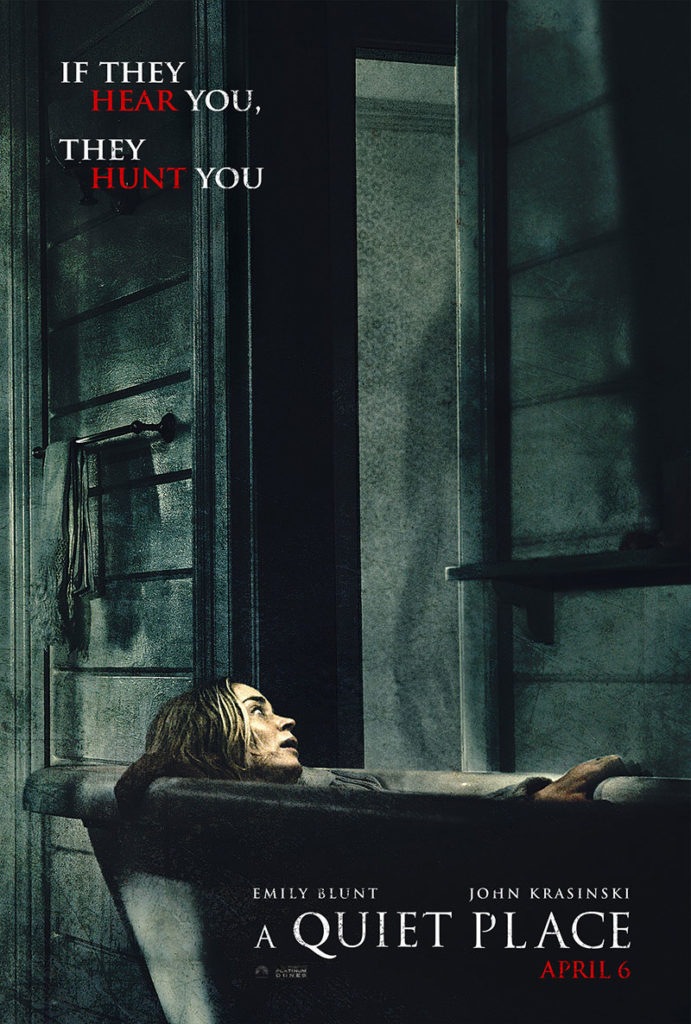It’s the near future — just a couple of years past the present day. The human race has been devastated by an invasion of ferocious creatures. Where the creatures come from is never made clear, although space is as good a culprit as any. The creatures are sightless, but have extraordinary hearing. Among the cacophony of sounds that a planet and all its inhabitants make, the creatures are able to pick out even the slightest of sounds made by a human, and hunt them down quickly. All remaining people are forced to live a life of silence that would try even the most devoted of monks. Such is the setup to A Quiet Place, the film from director/star John Krasinski, and writers Krasinski, Bryan Woods, and Scott Beck.
Krasinksi plays Lee Abbott. He’s husband to Evelyn (Emily Blunt), and father to Regan (Millicent Simmonds), Marcus (Noah Jupe), and Beau (Cade Woodward). The family lives at a beautiful farm, and appear to be surviving well. As they live their lives, they do so in total silence, going so far as to walk everywhere barefoot on a trail of sand to muffle their footsteps (the logistics of this aside, it’s still a neat idea). Even the act of knocking a glass off of a table is enough to bring the creatures around.
The family communicate with each other in sign language, which they had already learned to accommodate Regan, who is deaf. Their lives have a veneer of stability, but it is fragile. Every physical movement that a person makes has to be calculated beforehand to be as quiet as possible. It’s such an extreme avoidance of noise that footprints are painted on wooden stairs so the family will know where to step without making the boards creak.
In truth, no one, anywhere, could live like this. Making noise is an unavoidable part of the human experience, and may even be vital. It’s not just a physical threat these characters are suffering from. They are being oppressed with forced silence. The punishment for breaking the silence being so ultimate, it makes the stress the  Abbotts live under palpable. Early on in the film, Krasinski shows what happens when someone makes a noise, thus ensuring the audience is aware of the stakes throughout. This works better, I think, then if he had chosen to keep it a mystery as to why these characters are behaving in this way.
Abbotts live under palpable. Early on in the film, Krasinski shows what happens when someone makes a noise, thus ensuring the audience is aware of the stakes throughout. This works better, I think, then if he had chosen to keep it a mystery as to why these characters are behaving in this way.
As if things weren’t complicated enough in the Abbott household, Evelyn is pregnant. Soon there will be a birth, followed by a wailing child that the Abbott’s will have to muffle. But that’s thinking ahead. There is still the daily threat that has the potential to do in the Abbotts, regardless of whether there’s a baby hanging about that is incapable of understanding the danger.
Lee and Evelyn are raising their children to survive in this new reality, for however long it exists. To that end, Lee takes Marcus out of the farm to scrounge for supplies. It’s not the most essential aspect of the plot, but it is the part of the film that focuses the most on Marcus. Jupe did a good job playing Marcus. The kid is plain scared, as many boys his age probably would be in a similar situation. It’s easy, and sometimes pretty lazy, to attach adult behavior to children in a movie, but this film doesn’t do that. Marcus is alternately resourceful and in way over his head. Actions that an adult would take for granted, he struggles with. Meanwhile, Lee and Evelyn are as patient with him as they can be. After all, he’s just a kid. I was impressed with his performance because his fear seemed genuine, and like all children, he has to be dragged kicking and screaming into adult responsibilities.
The standout performer in the film, however, was Blunt. She was no less reliable then ever in most of the scenes, but it is when she goes into labor (of course this was going to happen) and has to stifle cries of pain, that her emotional and physical performance becomes something special. She suffers without relief, and I bought every second of it.
The movie could have become a pastiche of moments where someone makes noise and then there’s a jump scare. There are some set-piece moments in this film, but for the most part Krasinski weaved the frightening moments into the film in such a way that it never loses its flow. A couple of the predicaments strain suspension of disbelief (how could anyone be that unlucky), but the pace of the film and lack of jump scares shows maturity of storytelling from Krasinski. This is not a perfect horror flick, nor does it live up to the hype that surrounded it upon release. It’s merely unique and good.
